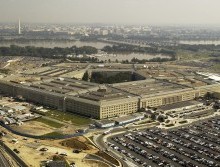The top United States defense official on Tuesday said the US is coordinating with regional partners to keep Syrian weapons of mass destruction “secure.” But when asked if that would involve the US military, Secretary of Defense Leon Panetta said, “Not at this point.”
Speaking to the media in comments published on the Department of Defense’s website, Panetta said that Syria’s chemical and biological weapon sites “remain a serious concern for us, and we continue to monitor those sites, working with Turkey, working with Jordan.
“We’ve had—we’ve been in discussions with Israel, as well, to determine what—you know, what steps need to be taken to ensure that those sites are secure and maintained so that those weapons don’t fall into the wrong hands.”
The US, Israel and Jordan have all publicly expressed concern about the danger posed by Syria’s notable WMD stockpile in the midst of that country’s chaos. Israel has been particularly troubled by the potential the weapons could reach the Hezbollah terror group in Lebanon. In addition, there are reports that Al Qaeda elements are in the country as well.
Syria’s internal conflict has killed thousands as the regime seeks to crackdown on what has become a militant opposition. Gen. Martin Dempsey, the top American military official as Chairman of the US Joint Chiefs of Staff, said the lengthy fight is taking its toll on the Syrian military.
“The Syrian army has been fighting now for about 18 months or so. And any army would be taxed with that kind of pace,” said Dempsey, speaking in the same briefing as Panetta. “So we are expecting that they are having—and, you know, sanctions and other pressures—they are having re-supply problems, they are having morale problems, they are having the kind of wear and tear that would come of being in a fight for as long as they have.”
Dempsey noted that Iran is providing training to a militia in Syria in support of the regime. “I actually think that’s why Iran is stepping in to form this militia to take some of the pressure off of the Syrian military.”
The US is providing the opposition in Syria with non-lethal support and has repeatedly called for President Bashar al-Assad to step down. Panetta believes it’s a matter of when, not if.
“We are seeing increasing defections. We’re seeing problems within their own military,” Panetta was quoted as saying. “And I think that it is a matter of time before we’re going to be successful in bringing Assad down and allowing the Syrian people to determine their future.”
(By Joshua Spurlock, www.themideastupdate.com, August 14, 2012)

